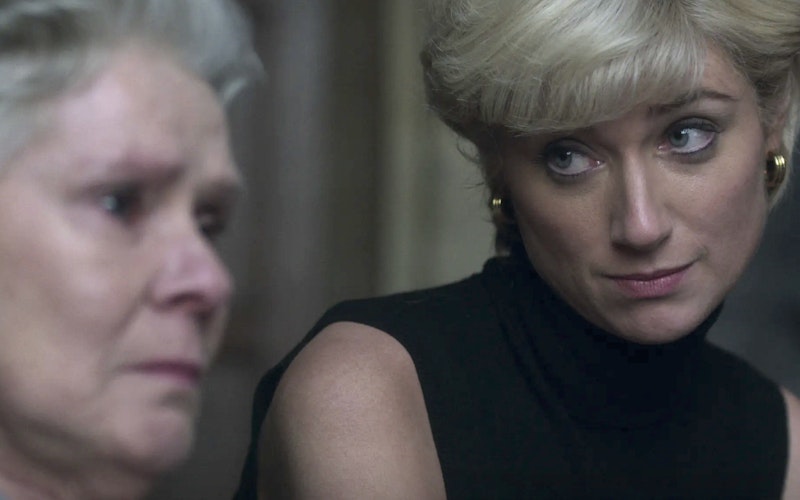
TV
Ghosts and Guilt in The Crown
“It didn’t need to be this way.”
This is what Diana (Elizabeth Debicki) tells Queen Elizabeth II (Imelda Staunton) at the end of “Aftermath,” the fourth episode in Season 6 of The Crown. Elizabeth sits on her couch in her study, watching coverage of the aftermath of Princess Diana’s death. She is fiddling with her pearls again, frustrated and resentful as she accuses Diana of drama and attention—even in death. Diana, of course, isn’t really there; the ghost we see holding Elizabeth’s hand is just a metaphor. But Elizabeth is haunted, nevertheless.
As I consider The Crown in its final season—four episodes have been released on Netflix, with the final six becoming available on Dec. 14—I want to introduce a theme that has rippled under the surface of the series: Queen Elizabeth’s mounting tension over her feelings of guilt. Guilt is a feeling of remorse, which follows one’s actions when they have caused pain, harm, and destruction to others. Guilt is an important feeling to recognize and respond to, particularly for Christians. In 2 Corinthians 7: 8-12, Paul describes guilt as a feeling of “godly sorrow.” The church in Corinthians was moved by this guilt to apologize for their sinful actions towards their community members. “Godly sorrow,” writes Paul, “brings repentance that leads to salvation . . .”
Over the course of The Crown, we see Elizabeth coping with guilt over many things. Think of all the marriages she has enforced and refused in her family and think of how this has pitted her children against her. I remember her gaslighting Diana during her marriage to Charles, thus contributing to her struggles with an eating disorder. Looking back over the seasons, the Queen’s perceived strength and dignity while acting as her country’s sovereign is contrasted with her inability to admit how she has wronged people. She has been trained not to do so, because “The Crown” cannot admit weakness.
I also think of how she claims to be a woman of faith throughout the series, yet in the light of the effects of her actions—or lack of action—her words and proclamations fall flat. There is a point in every season where Queen Elizabeth asks aloud if she is doing the right thing. Every season there comes a moment where Elizabeth kneels to pray. Does guilt move her towards repentance, towards true sorrow? She doesn’t seem to show it in obvious ways.
Over the course of The Crown, we see Elizabeth coping with guilt over many things
“They’re trying to show you who they are, and what they feel, what they need,” Diana’s ghost tells Elizabeth as they watch the British public mourn in front of Buckingham Palace. Elizabeth sits, motionless and without tears. It is hard to tell when the Queen feels sorrow. It is all Diana has been trying to get her mother-in-law to understand: people need care, need love, need empathy. They need you, Elizabeth, to not just be a Queen. They need you to be a human, too. Ghost Diana is a manifestation of Elizabeth’s inner thoughts. These are thoughts that she has already had, yet has not been able to admit to herself. “For as long as anyone can remember, you've taught us what it means to be British,” says Diana. “Maybe it's time to show you're ready to learn, too.” It’s unclear if this pushes the Queen to true repentance (we never get a true apology to anyone on screen, nor a recognition of how the royal family let Diana down), but we do see her composing a sincere, heartfelt—albeit stiffly delivered—tribute to Diana on national television.
After Diana’s funeral, we see the Queen by her bedside, clasping her hands together. Like so many other times, she is unable to be still. Her eyes flash open. But unlike the other times she has come before her Savior, there is a sense that Elizabeth is not alone. Elizabeth's head turns slowly to the right; as the camera pans with her, we expect to see someone kneeling next to her. But no one is there. Whatever is following her? Her past mistakes, her guilt, her regret—perhaps death itself is haunting her. Is this what it means to wear the Crown: to be haunted by ghosts? To be burdened with a sense of guilt? To realize how fragile life is, how closely death is following you?
Perhaps this is what The Crown has been trying to teach us all along: sorrow does not discriminate, pain does not have favorites, guilt will drive all of us to the foot of the cross, and death comes even for the most beautiful and powerful. “All have sinned and fall short of the glory of God,” Paul wrote in Romans 3. Even anointed kings and queens need the birth, life, death, and resurrection of God, wrapped in the humble skin of their own humanity, to save them completely and finally from themselves. May those humbling feelings of remorse move all of us towards compassion and tenderness, to repentance and change.
Topics: TV